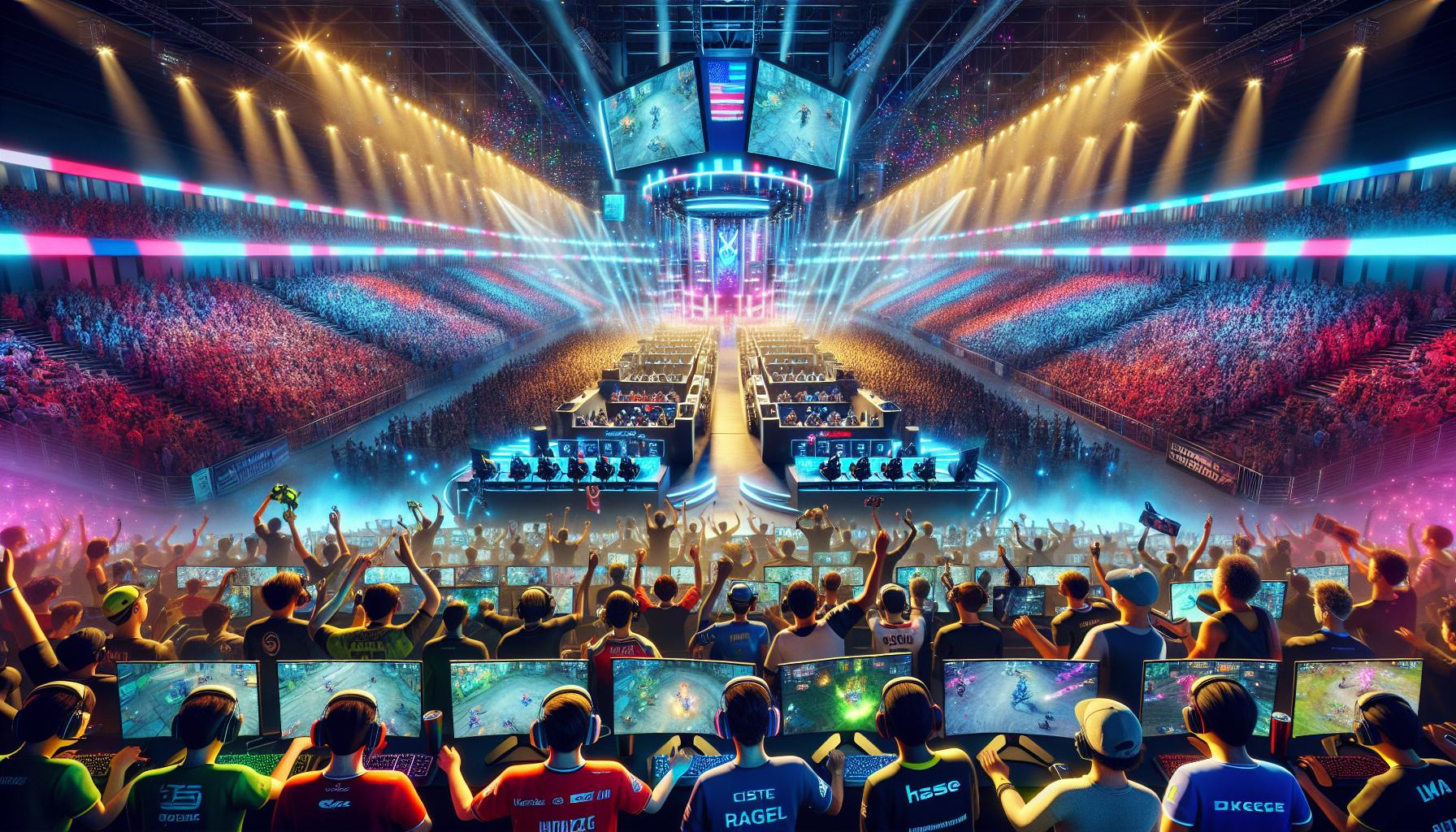
In a world where thumb dexterity can rival Olympic prowess, the debate between esports and gaming rages on like a heated match in a virtual arena. Some folks see esports as the glamorous cousin of gaming, complete with sponsorships and roaring crowds, while others argue that gaming is the heart and soul of the experience. But what’s the real difference?
Understanding Esports
Esports represents a competitive form of gaming that involves organized multiplayer video game competitions. These events attract large audiences and often include professional players and teams.
Definition of Esports
Esports refers specifically to competitive gaming that occurs in a formalized environment. Players participate in regulated tournaments, showcasing skills and strategy. Professional esports athletes often have sponsorships and contracts with organizations. Games like League of Legends and Dota 2 attract thousands of spectators both online and in-person. Companies invest in these tournaments due to their potential for high engagement and viewership. The esports ecosystem has grown significantly, reflecting a shift in how gaming is perceived in society.
Popular Esports Titles
Several titles dominate the esports landscape, each attracting large followings. League of Legends leads the pack, featuring a vibrant competitive scene with annual championships. Counter-Strike: Global Offensive captures a dedicated audience and boasts numerous tournaments worldwide. Dota 2 offers one of the largest prize pools in esports, further enhancing its appeal. Fortnite has revolutionized the gaming scene with its unique battle royale format. Overwatch combines team-based gameplay with a diverse character roster, making it popular among fans. These titles not only exemplify competitive gameplay but also highlight the diverse nature of esports.
The Gaming Landscape

Understanding gaming requires a precise definition. Gaming refers to the act of playing video games for entertainment, social interaction, or competition. It encompasses a wide array of genres and platforms including consoles, PCs, and mobile devices. Engaging in gaming serves different purposes, from casual enjoyment to strategic challenges.
Definition of Gaming
Gaming represents a multifaceted activity that combines interactive experiences, storytelling, and competition. Many players immerse themselves in intricate narratives, using their skills to navigate virtual worlds. Multiplayer options often enhance social connectivity, allowing individuals to collaborate or compete globally. Casual gaming focuses on simple mechanics and quick play, while more serious forms demand skill and strategy.
Different Types of Gaming
Diverse gaming types cater to various preferences. Action games emphasize physical challenges. Puzzle games engage critical thinking and problem-solving abilities. Role-playing games immerse players in character-driven narratives. Simulation games replicate real-life scenarios, offering players a chance to experiment within virtual environments. Sports games allow fans to take control of their favorite teams and players. Each type contributes uniquely to the expansive gaming landscape.
Esports vs Gaming
Esports and gaming are interconnected yet distinct worlds. Both share a foundation in video games, but each has its unique characteristics.
Similarities and Differences
Esports and gaming showcase competitive play, but the context varies. Esports operates through organized events, often featuring professional teams and substantial audiences. Gaming encompasses a broader spectrum, including casual play among friends or solo experiences. While esports emphasizes skill and strategy, traditional gaming focuses on enjoyment and personal achievement. Both revel in community engagement, yet the competitive nature of esports elevates its profile in the entertainment industry. Titles like Fortnite and League of Legends exemplify the difference; they highlight the competitive scene for esports while remaining popular gaming options for casual players.
The Community Aspect
Community plays a crucial role in both esports and gaming. Esports fosters a global audience, uniting fans through live events, streaming platforms, and social media. Players often build connections with fans, creating a vibrant, interactive online culture. In contrast, gaming encourages connections among players through co-op modes and multiplayer experiences. Friendships forged during casual play can lead to lasting relationships, enriching the overall experience. Online forums and gaming conventions further enhance community interactions, serving as platforms for sharing strategies and forming connections. Both sectors thrive on community spirit, driving enthusiasm, engagement, and continued growth.
The Impact of Esports on the Gaming Industry

Esports has transformed the gaming industry significantly, shaping its economic landscape and cultural presence. This impact is evident in various areas.
Economic Contributions
Esports generates substantial revenue through sponsorships, advertising, and ticket sales. In 2022, the global esports market reached over $1.4 billion, reflecting a yearly growth rate of 14.5%. Major esports events attract sponsors like Intel, Coca-Cola, and Red Bull, increasing brand visibility. Career opportunities in esports have also expanded, with roles such as team managers, event organizers, and content creators contributing to the job market. The heightened interest in esports encourages investments in game development and technology, further amplifying the industry’s overall growth.
Cultural Influence
Esports reshapes cultural perceptions of gaming, positioning it as a legitimate form of entertainment. The rise of professional gamers has cultivated a new celebrity culture, inspiring younger audiences to engage with video games. Streaming platforms, such as Twitch and YouTube, create spaces for players to showcase their skills and connect with fans. Tournaments draw thousands of spectators, reinforcing the communal aspects of gaming. Esports also influences other entertainment sectors, collaborating with music events and traditional sports, creating a blending of cultures that fosters inclusivity and innovation.
Future Trends in Esports and Gaming
The future of esports and gaming holds exciting possibilities. Advancements in technology and growing popularity play crucial roles in shaping this landscape.
Technological Advancements
Innovations in technology continuously enhance gaming experiences. Virtual reality (VR) and augmented reality (AR) offer immersive environments that elevate gameplay. Enhanced graphics engines also improve the visual appeal of games, drawing in more players. Streaming technology bridges the gap between gamers and audiences, enabling real-time interactions during competitions. Cloud gaming provides access to high-quality gaming experiences across devices without requiring powerful hardware. These advancements not only revolutionize gameplay but also increase the potential for esports to attract wider audiences. As developments unfold, gamers can expect a more engaging and interactive future.
Growing Popularity
Esports increasingly garners attention on a global scale. Major tournaments attract millions of viewers, rivaling traditional sporting events. Young audiences find excitement in the competitive nature of esports, driving its rapid expansion. Game publishers invest in esports ecosystems, fostering professional leagues and tournaments. Social media platforms amplify this reach, allowing fans to follow players and teams and engage with content. In 2022, the esports market exceeded $1.4 billion, showcasing significant economic growth. This surge in popularity also encourages brands to partner with esports events, further solidifying its status within the entertainment industry. The future promises continued growth and mainstream acceptance of esports.
The Future Looks Bright For Both Esports And Gaming
The distinction between esports and gaming is clear yet nuanced. Esports thrives on competition and organization while gaming encompasses a broader range of experiences. Both realms contribute significantly to the entertainment landscape and foster community engagement.
As technology continues to evolve the future looks bright for both esports and gaming. With innovations enhancing player experiences and growing audiences driving interest the potential for expansion remains vast. Embracing both aspects allows for a richer understanding of the gaming culture that captivates millions worldwide.
